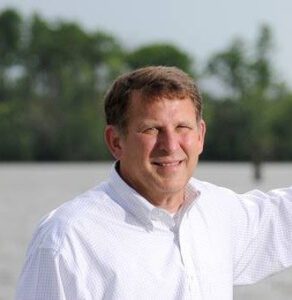Harrison Marks
40 Years, 40 Stories

HARRISON MARKS, WINSTON-SALEM
When Harrison Marks applied for the job as executive director of the Pamlico-Tar River Foundation, he was returning to his environmental roots. At Dartmouth College, he’d done environmental research on heavy metals and was heavily involved in the Dartmouth Outing Club, the oldest and largest collegiate club in the country, emphasizing outdoor recreation and environmental stewardship.
What followed college, however, was a career in banking.
“I spent my whole working career, until 2005, in banking institutions. I took an early retirement, I took a couple of years off, but I went back to work after the 2008 economic meltdown, until 2013. Then we moved back to New Bern, and I thought, ‘I’m too young to not do anything,’” he laughed.
Marks believes it was the sales pitch in his cover letter that got him an interview, but it was the combination of his passion for the environment and his background in business that got him hired.
“It was challenging. (Now Executive Director Heather Deck) certainly had all the environmental knowledge that the organization needed,” Marks said. “And I liked the challenge. I liked working on something that really mattered to me.”
When Marks came aboard in 2013, the battle to keep a limestone mining company from discharging up to 10 million gallons of fresh water per day into the brackish headwaters of Blounts Creek was ramping up.
“The first thing that I went to was a public hearing that was at the community college — I don’t even know that I’d been hired yet, but that’s was what was going on then, and I guess it’s still going on,” he said.
He found that in the nonprofit world, especially that of an environmental nonprofit, things were a bit different on the non-corporate side.
“Having come from a company — which I felt like for most of my career was pretty highly ethical — I was surprised that some companies were not open to discussion or reasonableness, and it was often necessary to litigate. I thought it would be possible to come up with reasonable solutions, but I found out really quickly that they weren’t interested in doing anything about the pollution they were creating. I thought, ‘Surely they would see reason,’” he said. “But I think the biggest surprise was how difficult it was to raise money. We’ve been fortunate with grants. Coming from a large organization like Wachovia, spending $5,000 wasn’t something you really thought about. But spending $500 at an environmental nonprofit is something you really have think about. Every gift matters. We know that Americans give a lot of money to charities, but to environmental nonprofits, it’s considerably less. It’s a little less tangible — the work of environmental organizations like Sound Rivers do — but it’s vitally important.”

Though at the helm of Sound Rivers for a short four years, Marks’ mark on the organization is significant: it was he who pushed the idea of PTRF joining forces with the Neuse River Foundation to form Sound Rivers, then oversaw the merger of two of North Carolina’s oldest grassroots conservation organizations.
“I talked about it with (then-PTRF Board President) Jerry Eatman, then met with Jim Kellenberger, who was the president of Neuse River Foundation,” Marks said. “I went to Oriental to meet Jim, and Jim, initially, wasn’t particularly interested.”
That changed during their meeting, when Marks pulled out a map of eastern North Carolina’s waterways.
“As we looked at the map together, Jim realized what it meant and what the organization could be, and he got on board. Then it was a matter of convincing both boards,” Marks laughed.
There were committee meetings held on neutral ground in Goldsboro and public meetings held with PTRF and NRF membership. Marks’ career in banking, overseeing several mergers, meant he was the ideal person to the lead the merger of PTRF and NRF to become a powerful advocate for waterways covering nearly a quarter of the state.
That Sound Rivers is thriving after 40 years, Marks credits Sound Rivers’ supporters, as well as the leadership of Deck after his retirement in 2017.
“It was clear to me that Heather was the right person for executive director. She worried about all the things an executive director does, so I told her ‘You may as well be executive director,’” he laughed. “Forty years is really impressive, and I think it’s a credit to the people of New Bern and Washington. I think the people who got it started, people like Dick Leach and Grace (Evans) and others that were there at the beginning — the fact that they saw the need, started it and kept it going for 40 years — and 40 years later, they’re still a voice for the river.”
After retiring, Harrison and his wife, Suzie, spent two years on their 38-foot Cabo Rico, sailing as far north as Maine and as far south as the Bahamas, before landing permanently in Winston-Salem.
